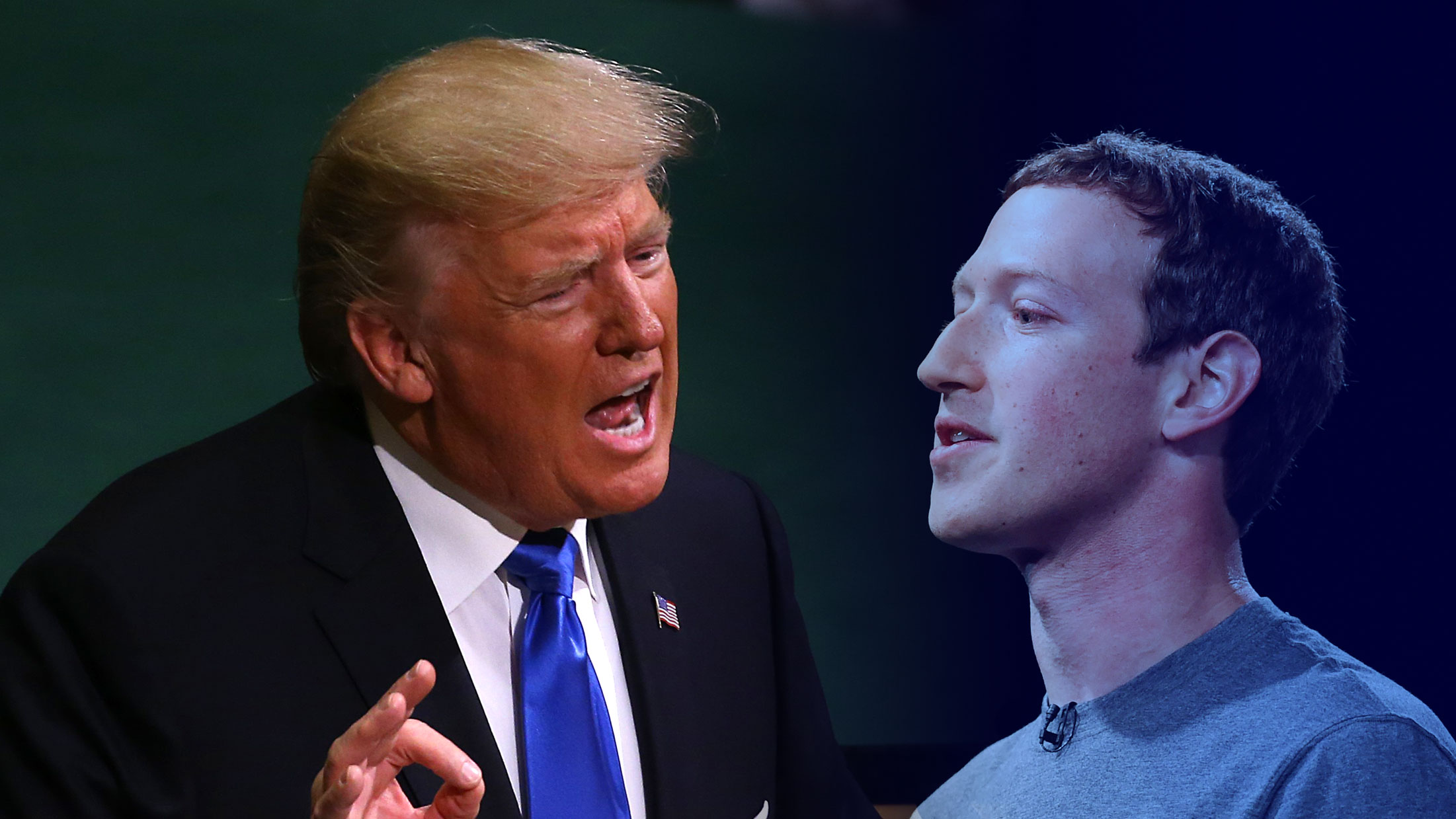The Zuckerberg-Trump Dynamic: Impact On Facebook And Beyond

Table of Contents
Facebook's Role in the 2016 Election and its Aftermath
The 2016 US presidential election exposed vulnerabilities in Facebook's platform, highlighting the platform's role in shaping public opinion and the spread of misinformation. The Zuckerberg-Trump dynamic became inextricably linked to these events, raising significant questions about Facebook's responsibility and its impact on the democratic process.
The Cambridge Analytica Scandal and its Impact
The Cambridge Analytica scandal, involving the harvesting of millions of Facebook users' data and its alleged use to target voters during the 2016 campaign, severely damaged Facebook's reputation. This event underscored concerns about data misuse, user privacy, and the potential for manipulation through social media.
- Data misuse: Cambridge Analytica improperly accessed user data, violating Facebook's terms of service and raising serious ethical and legal concerns.
- User privacy concerns: The scandal ignited a global conversation about the privacy implications of using social media platforms and the responsibility of companies like Facebook to protect user data.
- Regulatory scrutiny: The scandal triggered numerous investigations and regulatory actions against Facebook worldwide, leading to increased oversight and calls for stricter data protection laws.
- Impact on Facebook's reputation: The scandal significantly tarnished Facebook's image, leading to decreased public trust and increased calls for greater transparency and accountability.
The Spread of Misinformation and Political Advertising
Facebook's platform was utilized extensively during the 2016 election to disseminate misinformation and targeted political advertising, particularly by actors associated with the Trump campaign. The lack of effective controls allowed for the proliferation of fake news and foreign interference.
- Foreign interference: Evidence emerged of foreign actors using Facebook to spread propaganda and influence the election outcome.
- Fake news: The platform struggled to effectively identify and remove false or misleading information, contributing to the spread of fake news stories that impacted voters.
- Targeted advertising campaigns: Sophisticated targeting techniques allowed for the micro-targeting of voters with tailored messages, raising concerns about manipulation and the erosion of informed consent.
- Algorithm limitations: Facebook's algorithm, designed to maximize engagement, unintentionally amplified the reach of misleading and divisive content.
Zuckerberg's Testimony Before Congress
Mark Zuckerberg's appearances before the US Congress following the 2016 election and the Cambridge Analytica scandal became pivotal moments in the Zuckerberg-Trump dynamic. These testimonies exposed Facebook to intense public scrutiny and shaped the subsequent debate surrounding social media regulation.
- Key questions: Lawmakers questioned Zuckerberg about Facebook's data practices, its role in the spread of misinformation, and its responsibility in protecting users' privacy.
- Zuckerberg's responses: His responses were met with mixed reactions, with some praising his willingness to take responsibility and others criticizing his evasiveness.
- Public reaction: The hearings fueled public debate about the power and influence of social media companies and the need for greater regulation.
- Legislative consequences: The hearings led to increased calls for legislative action to regulate social media platforms, including enhanced data privacy protections and measures to combat misinformation.
The Trump Administration's Approach to Facebook and Tech Regulation
The Trump administration's relationship with Facebook, largely shaped by the Zuckerberg-Trump dynamic, was marked by both confrontation and cooperation, resulting in a mixed bag of regulatory actions and policy debates.
Allegations of Bias Against Conservatives
The Trump administration repeatedly accused Facebook of exhibiting anti-conservative bias, claiming that the platform unfairly censored or suppressed conservative viewpoints. These allegations fueled intense political debate about Section 230 and the role of social media companies in moderating content.
- Section 230 debates: The Trump administration considered repealing or significantly altering Section 230 of the Communications Decency Act, a law that shields online platforms from liability for user-generated content.
- Accusations of censorship: The administration repeatedly criticized Facebook for its content moderation policies, arguing that they disproportionately targeted conservative voices.
- White House meetings and statements: The administration held numerous meetings with Facebook executives and issued public statements expressing its concerns about alleged bias.
Antitrust Investigations and Regulatory Scrutiny
The Trump administration initiated several antitrust investigations into Facebook and other large technology companies, aiming to curb their market dominance and address concerns about anti-competitive practices.
- FTC investigations: The Federal Trade Commission (FTC) launched an extensive investigation into Facebook's business practices, culminating in a large fine for alleged anti-competitive behavior.
- Justice Department lawsuits: The Department of Justice filed an antitrust lawsuit against Facebook, arguing that the company engaged in anti-competitive conduct to maintain its dominance in the social media market.
- Impact on Facebook's business model: These investigations and lawsuits have put pressure on Facebook to alter its business model and potentially divest itself of certain assets.
The Long-Term Effects of the Zuckerberg-Trump Dynamic
The Zuckerberg-Trump dynamic has left a lasting legacy on Facebook and the broader social media landscape, shaping its policies, influencing global political discourse, and fostering ongoing debates surrounding social media regulation.
The Evolution of Facebook's Content Moderation Policies
The intense scrutiny following the 2016 election and the Trump administration's criticisms spurred significant changes in Facebook's content moderation policies.
- Changes in policies: Facebook has implemented new rules and algorithms aimed at combating misinformation, hate speech, and other harmful content.
- Increased scrutiny: The company now faces continuous pressure from governments, civil society organizations, and users to improve its content moderation efforts.
- Balancing free speech and content moderation: Facebook continues to grapple with the challenge of balancing free speech principles with the need to remove harmful content from its platform.
The Impact on Global Political Discourse
The Zuckerberg-Trump dynamic had a significant impact on political discourse worldwide, influencing how social media platforms are used in elections and political campaigns globally.
- International implications: The events in the US served as a warning for other countries about the potential for misinformation and foreign interference in elections.
- Influence on elections in other countries: Similar controversies involving social media and political campaigns have emerged in numerous countries, reflecting the global implications of the Zuckerberg-Trump dynamic.
- Global debates on social media regulation: The debate surrounding social media regulation is now a global phenomenon, with many countries considering new laws and regulations to address the challenges raised by the events of 2016.
The Future of Social Media Regulation
The lingering effects of the Zuckerberg-Trump dynamic have spurred intense debate and ongoing efforts towards comprehensive social media regulation.
- Proposed legislation: Numerous legislative proposals have been introduced worldwide to address issues such as misinformation, data privacy, and antitrust concerns.
- Ethical considerations: The ongoing debate involves ethical considerations concerning free speech, censorship, and the role of technology companies in democratic processes.
- The role of tech companies in democratic processes: The future of social media will likely involve greater transparency, accountability, and regulatory oversight to safeguard democratic values and protect users' rights.
Conclusion
The Zuckerberg-Trump dynamic has profoundly impacted Facebook, increasing scrutiny, reshaping its policies, and influencing global political discourse. The interplay between a dominant social media platform and a highly influential political figure highlighted critical issues of misinformation, content moderation, and technology's role in democracy. Understanding this complex relationship is crucial for navigating the future of social media and its impact on society. Further research into the Zuckerberg-Trump dynamic, its influence on Facebook's algorithms, and its broader impact on political communication is essential to inform effective policymaking and ensure the responsible use of social media platforms. We must continue to analyze the complexities of this relationship to address the challenges it presents for online communication and democratic processes.

Featured Posts
-
 Meta Under Trump Zuckerbergs Challenges And Opportunities
May 10, 2025
Meta Under Trump Zuckerbergs Challenges And Opportunities
May 10, 2025 -
 9 Maya V Kieve Kto Iz Soyuznikov Ukrainy Priedet
May 10, 2025
9 Maya V Kieve Kto Iz Soyuznikov Ukrainy Priedet
May 10, 2025 -
 Us Funding Of Transgender Mouse Research A Comprehensive Overview
May 10, 2025
Us Funding Of Transgender Mouse Research A Comprehensive Overview
May 10, 2025 -
 Nhs Staff Access To Nottingham Attack Victim Records Concerns Raised Over Data Breach
May 10, 2025
Nhs Staff Access To Nottingham Attack Victim Records Concerns Raised Over Data Breach
May 10, 2025 -
 Thailands Transgender Community A Fight For Equality Featured In The Bangkok Post
May 10, 2025
Thailands Transgender Community A Fight For Equality Featured In The Bangkok Post
May 10, 2025
